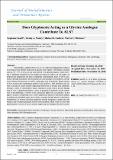Does Glyphosate Acting as a Glycine Analogue Contribute To ALS?
Author(s)
Seneff, Stephanie; Morley, Wendy A.; Hadden, Michael J.; Michener, Martin C.
DownloadLinks between glyphosate and ALS (1.654Mb)
PUBLISHER_CC
Publisher with Creative Commons License
Creative Commons Attribution
Terms of use
Metadata
Show full item recordAbstract
Amyotrophic Lateral Sclerosis (ALS) is a fatal neurodegenerative disease involving several protein mutations in glycine-rich regions with limited treatment options. 90 - 95% of all cases are non-familial with epidemiological studies showing a significant increased risk in glyphosate-exposed workers. In this paper, we propose that glyphosate, the active ingredient in Roundup®, plays a role in ALS, mainly through mistakenly substituting for glycine during protein synthesis, disruption of mineral homeostasis as well as setting up a state of dysbiosis. Mouse models of ALS reveal a pre-symptomatic profile of gut dysbiosis. This dysbiotic state initiate a cascade of events initially impairing metabolism in the gut, and, ultimately, through a series of intermediate stages, leading to motor neuron axonal damage seen in ALS. Lipopolysaccharide, a toxic by-product of dysbiosis which contributes to the pathology, is shown to be statistically higher in ALS patients. In this paper we paint a compelling view of how glyphosate exerts its deleterious effects, including mitochondrial stress and oxidative damage through glycine substitution. Furthermore, its mineral chelation properties disrupt manganese, copper and zinc balance, and it induces glutamate toxicity in the synapse, which results in a die-back phenomenon in axons of motor neurons supplying the damaged skeletal muscles.
Date issued
2016-11Department
Massachusetts Institute of Technology. Computer Science and Artificial Intelligence LaboratoryJournal
Journal of Bioinformatics and Proteomics Review
Publisher
Ommega Publishers
Citation
Seneff, Stephanie; Morley, Wendy A.; Hadden, Michael J. and Michener, Martin C. “Does Glyphosate Acting as a Glycine Analogue Contribute To ALS?” Journal of Bioinformatics and Proteomics Review 2, no. 3 (November 2016): 1–21 © 2017 Seneff, S.
Version: Final published version
ISSN
2381-0793